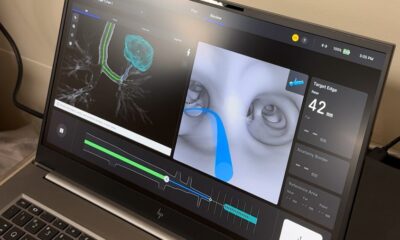Health
Alternatives to Hormone Therapy Offer Relief for Menopausal Symptoms

Menopause can bring a range of challenging symptoms, such as hot flashes, night sweats, and sleep disturbances. For women like Shilpa Gajarawala, a 58-year-old physician assistant from Jacksonville, Florida, managing these symptoms is complicated by a history of breast cancer, which precludes the use of hormone therapy. “For two years, I tried to kind of power through,” Gajarawala explained. Fortunately, experts emphasize that effective alternatives exist for women who cannot or choose not to undergo hormone treatment.
Recent changes to medication labels have highlighted the potential benefits and risks of hormone therapy, prompting more women to consider these options. Yet, many women, including those with certain medical histories, may need to avoid hormone therapy. Conditions such as severe liver disease, a history of heart attack, stroke, blood clots, or hormone-sensitive breast cancer may necessitate a different approach.
Exploring Lifestyle Changes and Non-Hormonal Options
Doctors suggest that lifestyle modifications can significantly alleviate menopausal symptoms. Increasing physical activity plays a key role; while exercise does not directly reduce menopausal symptoms, it can help with weight management, which is linked to a decrease in hot flashes and night sweats. Dr. Stephanie Faubion, medical director at the Mayo Clinic Center for Women’s Health, recommends a combination of aerobic exercises, such as running or walking, with strength training to combat bone density loss.
Diet also plays an essential role in managing symptoms. Emerging research suggests that a “plant-forward diet”—rich in fruits, vegetables, and soy while low in oils—may help manage hot flashes. Although the exact reasons remain unclear, some experts speculate that weight loss associated with dietary changes may contribute to symptom relief. Additionally, avoiding triggers like caffeine and alcohol can further reduce the likelihood of experiencing hot flashes.
Maintaining cardiovascular health is crucial during menopause due to the significant decline in estrogen and progesterone levels. This hormonal drop can lead to increased blood pressure and cholesterol. “It’s important that we focus on maintaining cardiovascular health,” Faubion said, emphasizing the need to stop smoking, ensure adequate sleep, and manage stress.
Medications and Alternative Therapies
Beyond lifestyle changes, several non-hormonal prescription medications have shown promise in easing menopausal symptoms. Antidepressants have been found to alleviate hot flashes and improve mood. New data indicates that oxybutynin, typically prescribed for overactive bladder, may also help reduce hot flashes.
Newly approved medications, such as Veozah (fezolinetant) and Lynkuet (elinzanetant), target the brain’s temperature regulation center, effectively blocking the causes of hot flashes and night sweats. While these medications provide hope, they are not without potential side effects. Veozah carries a warning about rare but serious liver injury, while Lynkuet may cause fatigue and difficulty staying awake.
Dr. JoAnn Manson from Harvard Medical School notes that “there’s no medication out there that’s entirely free of risk.” Some antidepressants may lead to weight gain, although this is generally associated with higher doses than those prescribed for menopause symptoms. Oxybutynin can also cause dry mouth and, in some cases, bladder issues.
Over-the-counter products are available for managing certain menopausal symptoms as well. Vaginal lubricants can alleviate dryness, while cognitive behavioral therapy may help women cope with hot flashes. “It’s not like it’s going to make you not have a hot flash,” Faubion remarked. “But it makes them less significant for you and less burdensome.”
Emerging evidence also suggests that clinical hypnosis may help reduce the frequency and severity of hot flashes, although further research is needed to establish its efficacy.
Ultimately, experts stress that women should not feel compelled to simply endure menopause. Dr. Juliana Kling, a women’s health expert at the Mayo Clinic Alix School of Medicine, encourages women to engage in discussions about potential treatment options. Gajarawala exemplifies this proactive approach; she has made lifestyle changes, avoiding red wine, walking at least 10,000 steps daily, practicing tai chi, and taking an extended-release antidepressant to address her symptoms. “It’s been a significant improvement,” she shared.
As awareness of alternative treatments grows, women experiencing menopausal symptoms have more resources than ever to find relief and enhance their quality of life.
-

 Technology5 months ago
Technology5 months agoDiscover the Top 10 Calorie Counting Apps of 2025
-

 Health3 months ago
Health3 months agoBella Hadid Shares Health Update After Treatment for Lyme Disease
-

 Health3 months ago
Health3 months agoErin Bates Shares Recovery Update Following Sepsis Complications
-

 Technology4 months ago
Technology4 months agoDiscover How to Reverse Image Search Using ChatGPT Effortlessly
-

 Technology1 month ago
Technology1 month agoDiscover 2025’s Top GPUs for Exceptional 4K Gaming Performance
-

 Technology3 months ago
Technology3 months agoElectric Moto Influencer Surronster Arrested in Tijuana
-

 Technology5 months ago
Technology5 months agoMeta Initiates $60B AI Data Center Expansion, Starting in Ohio
-

 Technology5 months ago
Technology5 months agoRecovering a Suspended TikTok Account: A Step-by-Step Guide
-

 Health4 months ago
Health4 months agoTested: Rab Firewall Mountain Jacket Survives Harsh Conditions
-

 Lifestyle5 months ago
Lifestyle5 months agoBelton Family Reunites After Daughter Survives Hill Country Floods
-

 Technology4 months ago
Technology4 months agoHarmonic Launches AI Chatbot App to Transform Mathematical Reasoning
-

 Health3 months ago
Health3 months agoAnalysts Project Stronger Growth for Apple’s iPhone 17 Lineup





















